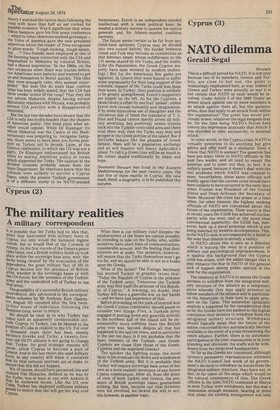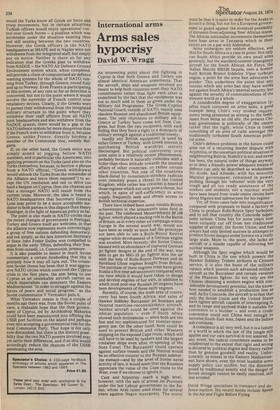NATO dilemma
Gerald Segal
Brussels This is a difficult period for NATO. It is not only because two of its members, Greece and Turkey, are close to but not, the point is reassuringly emphasised here, at war. Indeed if Greece and Turkey were actually at war it is not certain that NATO as such would be involved. Under Article 5 of the 1949 Treaty an armed attack against one or more members is an attack against them all, but the question arises, does that apply to an attack from within the organisation? The point has never previously arisen: whatever the legal exegesis may be, for the time being NATO's forces here convey the impression anxiously that Article 5 was intended to refer, exclusively, to external attack.
In other words, in the Cyprus crisis, NATO is virtually powerless to do anything but give advice and offer itself as a mediator. Does it follow that NATO is useless? The question has been put many times to NATO officials in the past two weeks, and all tend to resent the question and to point out that, in fact, it is unfairly posed, because it doesn't deal with the real problems which NATO was created to meet. Nevertheless, these same officials will readily agree that the current crisis would have been unlikely to have occurred in the early days when Truman was President of the United States and Dean Acheson the Secretary of State. Moreover the crisis has arisen at a time when, for other reasons, the highest ranking officials of NATO are concerned about the future of the organisation. Their worry is that in recent years the USSR has achieved nuclear parity with the west, and at the same time conventional superiority: the USSR has, moreover, built up a naval potential which is not being matched by western developments. This, in the NATO view, is accompanied by a belief in the west that détente is already a reality.
In NATO circles this is seen as a delusion which is leaving the west in a position of military and psychological unpreparedness. It is against this background that the Cyprus crisis has arisen, with the added danger that it may enhance the fear in NATO of the general lack of support among public opinion in the west for the organisation.
The tendency at NATO is to assess the Greek decision to withdraw from the integrated military structure of the alliance as a temporary move whereby they may apply pressure on fellow members of the alliance and in particular on the Americans, in their turn to apply pressure on the Turks. This somewhat optimistic analysis is supported by the consideration that so far the Greeks have not pushed to the logical conclusion their decision to withdraw from the integrated military structure. Withdrawal should logically mean that the forces of the nation concerned do not automatically become available in the event of a crisis threatening the entire alliance. Further, there is no automatic participation in the joint manoeuvres or in joint planning and obviously the staffs will be withdrawn from the integrated headquarters. So far as the Greeks are concerned, although Greece's permanent representative informed the NATO Council last week of its government's decision to withdraw its forces from the integrated military structure, they have not, in fact, so far taken all the steps which would be the natural consequence of this. The Greek officers in the joint NATO command at Ifmiya in west Turkey were withdrawn, but this was a reasonable enough measure, bearing in mind that under the existing arrangement not only would the Turks know all Greek air force and troop movements, but in certain situations Turkish officers would enjoy operational control over Greek forces — a position which was intolerable under the situation existing then and still existing between the two countries. However, the Greek officers in the NATO headquarters at SHAPE and in Naples were not withdrawn from the integrated staff, but simply put on notice. Neither is there so far any indication that the Greeks plan to withdraw from NADGE — the NATO Air Defence Ground Environment system which, when completed, will provide a chain of computerised air defence warning systems for the whole of NATO, running from Turkey, through Greece, round Italy and up to Norway. Even France is participating in this system, at any rate so far as detection is concerned, but not to the point where it would involve the surrender of French control over retaliatory devices. Clearly, if the Greeks were to pursue their withdrawal from the integrated military structure to the point where they withdrew their staff officers from all NATO joint headquarters and also withdrew from the NADGE system, there would be a gap in the NATO defence system far more dangerous than if the French were to withdraw from it, because Greece, unlike France, directly borders a member of the Communist bloc, namely Bulgaria. If, on the other hand, the Greek move was simply aimed at jogging fellow NATO members, and in particular the Americans, into applying pressure on the Turks (and also on the Turks themselves, because, to borrow a phrase from a NATO official, "Greek withdrawal would unhook the Turks from the remainder of the Alliance and leave them exposed") to accept the UN resolution and not to drive too hard a bargain on Cyprus, then the chances are that a stronger NATO will result from the current crisis. Moreover, the idea is heard in NATO headquarters that Secretary General Luns may prove to be a more acceptable mediator to both parties in this dispute than Henry Kissinger, in the light of American policy so far. The point is also made in NATO circles that the recent changes of government in Portugal, Turkey and Greece itself are welcome, in that the alliance now represents more convincingly a group of free nations defending democracy, and not simply, as the late American Secretary of State John Foster Dulles was compelled to argue in the early 'fifties, defending their freedom from outside, i.e. Communist, pressure.
It is also possible to detect in much Soviet commentary a certain foreboding that this is precisely how it may all turn out. The consistent Soviet theme has been that it was aggressive NATO circles which contrived the Cyprus crisis in the first place, the aim being to use Cyprus as an unsinkable aircraft carrier on which imperialism can dominate the Eastern Mediterranean "in order to struggle against the forces of peace and social progress," as the Soviet commentator V Yermakov puts it.
What Yermakov means is that a couple of months ago there was, from the Soviet point of view, a realisable hope that the then government of Cyprus, led by Archbishop Makarios could have been manoeuvred into offering the USSR port facilities on the island and perhaps even into accepting a governmental role for the local Communist Party. That hope is not only now diminished, but there is the distinct possibility that the two NATO powers involved may yet settle their differences, and if so this would accordingly reduce the chances of the USSR penetrating the area.



































 Previous page
Previous page